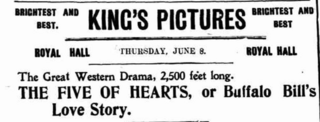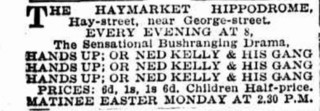Related Research Articles

Lottie Lyell was an Australian actress, screenwriter, editor and filmmaker. She is regarded as Australia's first film star, and also contributed to the local industry during the silent era through her collaborations with director and writer Raymond Longford.

Bushranger's Ransom, or A Ride for Life was an Australian silent film produced by Pathé Frères' in 1911, their first motion picture production in Australia after establishing a branch office in Sydney in April 1910. It was adapted from a stage play first performed in 1907 by E. I. Cole's Bohemian Dramatic Company.

The Five of Hearts, or Buffalo Bill's Love Story is a 1911 Australian film from Edward Irham Cole based on a stage play about Buffalo Bill which Cole had performed extensively. It is also known as A Maiden's Distress or Buffalo Bill. It was reportedly the longest of Cole's films.

Sentenced for Life is an Australian film directed by E. I. Cole. It was an adaptation of a play performed by Cole and his Bohemian Dramatic Company as early as 1904.
The Native Born is an Australian play written by Bert Bailey and Edmund Duggan under the name of Albert Edmunds. It was first produced in 1913 by Bailey's own company.
The Kelly Gang; or the Career of the Outlaw, Ned Kelly, the Iron-clad Bushranger of Australia is an 1899 Australian play about bushranger Ned Kelly. It is attributed to Arnold Denham but it is likely a number of other writers worked on it.

Edward Irham Cole was an Australian theatrical entrepreneur and film director whose productions represented a synthesis of Wild West show and stage melodrama. He managed a theatre company, called the Bohemian Dramatic Company, that performed in semi-permanent and temporary tent theatres. During 1910 and 1911 Cole directed a number of silent films, adapted from his stage plays and using actors from his theatre company.
Keane of Kalgoorlie is a 1907 Australian novel by Arthur Wright that was adapted into a play and film.

Wirth's Circus, also known as Wirth Brothers' Circus, was Australia's largest and most prestigious circus company for eight decades. Billed as Australia's own 'Greatest show on Earth', the travelling circus held an international reputation.
The King of the Road is a 1900 Australian play performed by Edward Irham Cole performed by Cole's Bohemian Drama Company about the bushranger Ben Hall.

Hands Up, or Ned Kelly and His Gang is a 1900 Australian play by Edward Irham Cole about Ned Kelly.
Whirlwind, the Bushranger, or the Roaring Forties is a 1907 Australian play by Edward Irham Cole about the ficitious bushranger.
With the Colours is a 1905 Australian stage drama by Edward Irham Cole set during the Second Boer War. It became one of the key plays in Cole's repertoire.
A Convict's Sweetheart is a 1906 Australian play performed by Edward Irham Cole's Bohemian Dramatic Company. It may have been written by Cole.
Coo-ee; Or, Wild Days in the Bush is a 1906 Australian play by Edward William O'Sullivan. It was originally performed by Edward Irham Cole's Bohemian Dramatic Company.
Captain Moonlite, the Wantabadgery Bushranger is a 1906 Australian play about the bushranger Captain Moonlite that was first produced by Edward Irham Cole's Bohemian Dramatic Company.
For King and Empire is a 1906 Australian play by Edward Irham Cole although several scenes and incidents were suggested by Edward William O'Sullivan.
Outlawed by Fate, or the Bushranger's Bride is a 1908 Australian stage play that was presented by Edward Irham Cole's Bohemian Dramatic Company.
Hunted to Death, or Tales of Old Bendigo is a 1907 Australian stage play that was presented by Edward Irham Cole's Bohemian Drama Company. The play made its world debut in Melbourne. The play then toured in Sydney.
Colonial Experience is a 1868 Australian stage play by Walter Cooper. It was Cooper's first play and the only one known to have survived in script form.
References
- ↑ "THE HAYMARKET HIPPODROME". The Sydney Morning Herald . No. 21, 671. New South Wales, Australia. 3 July 1907. p. 12. Retrieved 4 April 2024– via National Library of Australia.
- ↑ Williams, Margaret (1983). Australia on the popular stage, 1829-1929 : an historical entertainment in six acts. p. 197.
- ↑ "Advertising". The Sydney Morning Herald . No. 20, 554. New South Wales, Australia. 23 January 1904. p. 2. Retrieved 4 April 2024– via National Library of Australia.
- ↑ "Music and Drama". The Sunday Sun. No. 164. New South Wales, Australia. 20 May 1906. p. 2. Retrieved 4 April 2024– via National Library of Australia.
- ↑ "AMUSEMENTS". The Age . No. 16, 231. Victoria, Australia. 20 March 1907. p. 10. Retrieved 4 April 2024– via National Library of Australia.
- ↑ "Advertising". The Age . No. 16, 234. Victoria, Australia. 23 March 1907. p. 18. Retrieved 4 April 2024– via National Library of Australia.
- ↑ "THE HAYMARKET HIPPODROME". The Sydney Morning Herald . No. 21, 669. New South Wales, Australia. 1 July 1907. p. 5. Retrieved 4 April 2024– via National Library of Australia.
- ↑ "BILL OF THE PLAY". The Newsletter: an Australian Paper for Australian People . Vol. 6, no. 71. New South Wales, Australia. 30 January 1904. p. 7. Retrieved 4 April 2024– via National Library of Australia.
- ↑ "AMUSEMENTS". Barrier Miner . Vol. XXVIII, no. 8557. New South Wales, Australia. 22 January 1916. p. 5. Retrieved 4 April 2024– via National Library of Australia.